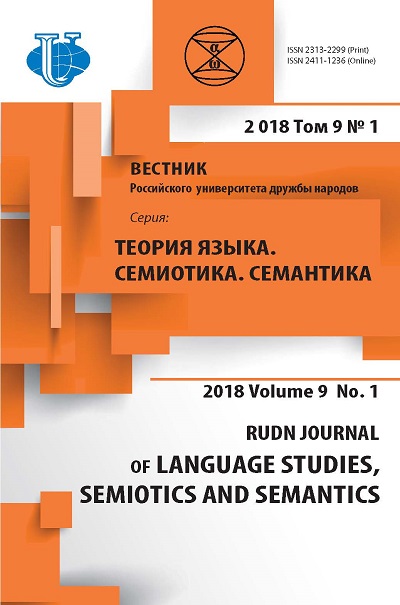Russian and Рolish political lexis of the proto-slavic origin
- Authors: Kobylko J.1
-
Affiliations:
- RUDN University
- Issue: Vol 9, No 1 (2018)
- Pages: 213-222
- Section: POLITICAL LINGUISTICS. SCIENCE 21.0
- URL: https://journals.rudn.ru/semiotics-semantics/article/view/18278
- DOI: https://doi.org/10.22363/2313-2299-2018-9-1-213-222
- ID: 18278
Cite item
Full Text
Abstract
Due to the genetic proximity of the Russian and Polish languages may seem, that political terms of both discussed languages overlap. Actively complementing the political thesaurus of vernacular with the using of different normative and individual word formation. Contemporary communication is filled, above all, with the language of politics. Therefore, political lexis is made available to all carrier for vernacular. Specialist vocabulary is used, above all, by experts and analysts. Mass media play important role in this process, constituting an effective mechanism of impact on social consciousness. See all the similarities and differences between political terms in Russian and Polish by lexical material and analyzing specific terms. The study’s validity is a poorly developed comparative analysis of Russian and Polish political terminology. The Russian and Polish lexis of the Proto-Slavic origin, in which the meanings were changing, as well as common concepts, which represent different origins with words. The material studied is called political processes, institutions and people. The terminology was collected from Russian-Polish lexicography and mass media texts.
Keywords
About the authors
Jaroslaw Kobylko
RUDN University
Author for correspondence.
Email: jaroslaw.kobylko@yandex.ru
Post-graduate student of the General and Russian Linguistics Department, RUDN University; Interests: lexicography, morphology, semantics
6, Miklukho-Maklaya Str., Moscow, Russia, 117198References
- Trubetskoy, N.S. (1927). On the Slavic element in Russian culture. On the problem of Russian self-awareness: volume of essays, Paris. (In Russ).
- Trubetskoy, N.S. (1987). Selected works. Moscow: Progress. (In Russ).
- Shansky, N.M. & Bobrova, T.A. (2004). School etymological dictionary of the Russian language. Origin of words. Moscow: Drofа. URL: http://enc-dic.com/rusethy/Posol-3196/ (accessed: 27.12.2017). (In Russ).
- Dmitriev, D.V. (2003). Explanatory dictionary of the Russian language. Moscow: Astrel. URL: http://enc-dic.com/dmytriev/Posol-3204/ (accessed: 27.12.2017). (In Russ).
- Kopalinski, W. (2000). Dictionary of words and phrases of foreign origin. Warsaw: Muza SA.
- Wasiluk, J. & Zmarzer, W. (2011). Russian-Polish dictionary political terminology. Warsaw: Institute of russian studies UW.
- Fasmer, M. (1964—1973). Etymological dictionary of the Russian language in 4 t. Moscow: Progress. URL: http://enc-dic.com/fasmer/Deputat-3752.html (accessed: 27.12.2017). (In Russ).
- Klemensievich, Z. (2002). History of Polish language. Warsaw: PWN. (In Pl.).
- Khvatov, S. & Timoshuk, M. (2008). Polish-Russian and Russian-Polish Dictionary. Warsaw: Rea.
- Kuznetsov, S.A. (Ed.). (1998). Large explanatory dictionary of the Russian language. Saint Petersburg: Norint. URL: http://enc-dic.com/kuzhecov/Palata-24172.html (accessed: 03.01.2018). (In Russ).
- Slovorod. URL: http://www.slovorod.ru/ (accessed: 03.01.2018). (In Russ).
- Jackovska I. Gazeta pravna. Encyklopedia. URL: http://www.gazetaprawna.pl/encyklopedia/ prawo/hasla/334617,czyn.html (accessed: 03.01.2018).
- Krylov, P.A. (2005). Etymological dictionary of the Russian language. Saint Petersburg: Poligraf uslugi. URL: http://enc-dic.com/krylov/Urjadnik-506.html (accessed: 04.08.2018). (In Russ).
- Lepkovski, T. (1973). Historical dictionary of Poland. Warsaw: Wiedza Poszechna.
- Drabik, L. (1996). Polish dictionary PWN. Warsaw: PWN.
- Dal, V. (Ed.). (2009). Dictionary of the Living Great Russian language in 4 t. Moscow: Olma-Press. URL: http://enc-dic.com/dal/Vodit-3345/ (accessed: 04.08.2018). (In Russ).
Supplementary files












